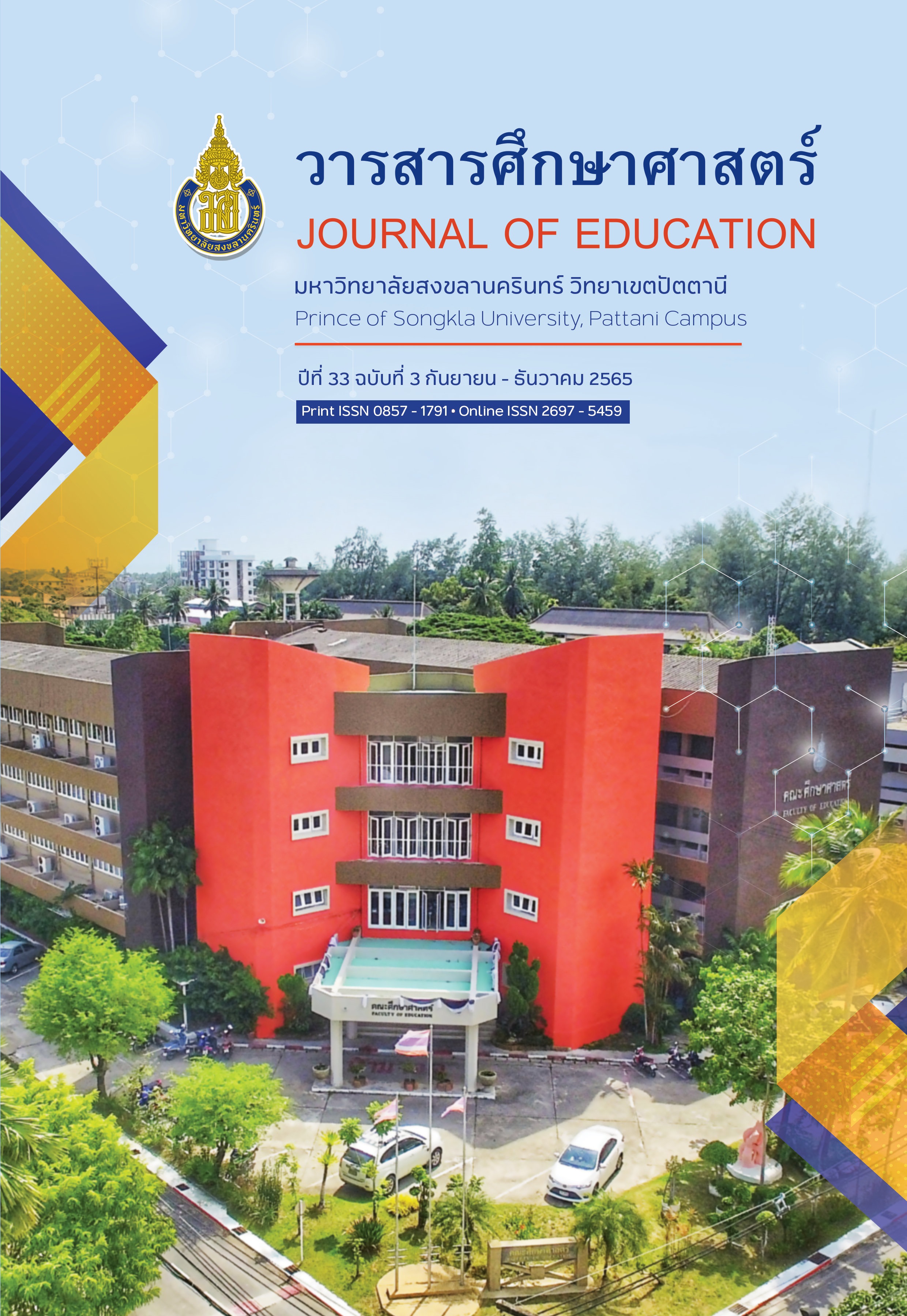องค์ประกอบเชิงยืนยันของตัวชี้วัดการติดตามและประเมินการจัดการเรียนรู้ที่เน้นผู้เรียนเป็นสำคัญของสถานศึกษาระดับการศึกษาขั้นพื้นฐาน
Main Article Content
บทคัดย่อ
การวิจัยนี้มีวัตถุประสงค์เพื่อ 1) ศึกษาสภาพการจัดการเรียนรู้ที่เน้นผู้เรียนเป็นสำคัญ 2) พัฒนาองค์ประกอบและตัวชี้วัดการติดตามและประเมินการจัดการเรียนรู้ที่เน้นผู้เรียนเป็นสำคัญ กลุ่มตัวอย่างเป็นครูผู้สอน 4 กลุ่มสาระการเรียนรู้หลัก 631 คน จากโรงเรียนในสำนักงานศึกษาธิการภาค 12 โดยสุ่มแบบหลายขั้นตอน เครื่องมือวิจัยเป็นแบบสอบถาม 1 ฉบับแบบมาตรประมาณค่า 5 ระดับ ตรวจสอบความตรงเชิงเนื้อหา โดยผู้เชี่ยวชาญ 5 ท่าน ได้ค่า IOC รายข้อระหว่าง 0.80-1.00 ทดลองใช้กับครูผู้สอน 30 คน ตรวจสอบความเชื่อมั่นด้วยการวิเคราะห์หาสัมประสิทธิ์แอลฟาของครอนบาค มีค่าความเชื่อมั่นทั้งฉบับ .956 วิเคราะห์ข้อมูลเพื่อหาค่าสถิติด้วยโปรแกรมคอมพิวเตอร์สำเร็จรูป และใช้โปรแกรม Mplus ในการวิเคราะห์องค์ประกอบเชิงยืนยัน
ผลการวิจัย พบว่า สภาพการจัดการเรียนรู้ที่เน้นผู้เรียนเป็นสำคัญ โดยรวมมีค่าเฉลี่ยระดับมาก (Mean=4.224, S.D.=0.681) ด้านการจัดการเรียนรู้ของครูผู้สอน โดยรวมมีค่าเฉลี่ยระดับมาก (Mean=4.276, S.D.=0.676) ประเด็นที่มีค่าเฉลี่ยสูงสุด คือ การบริหารจัดการชั้นเรียนเชิงบวก (Mean=4.476, S.D.=0.608) ประเด็นที่มีค่าเฉลี่ยต่ำสุด คือ การใช้สื่อ เทคโนโลยีสารสนเทศ และแหล่งเรียนรู้ที่เอื้อต่อการเรียนรู้ (Mean=4.188, S.D.=0.711) ด้านผลการเรียนรู้ของผู้เรียน โดยรวมมีค่าเฉลี่ยระดับมาก (Mean=4.171, S.D.=0.682) ประเด็นที่มีค่าเฉลี่ยสูงสุดคือ ปฏิสัมพันธ์และการมีส่วนร่วม (Mean=4.308, S.D.=0.673) และประเด็นที่มีค่าเฉลี่ยต่ำสุด คือ ความสามารถด้านการคิดและการลงมือปฏิบัติ (Mean=4.121, S.D.=0.683) ผลการวิเคราะห์องค์ประกอบเชิงยืนยันโมเดลตัวชี้วัดการติดตามและประเมินการจัดการเรียนรู้ที่เน้นผู้เรียนเป็นสำคัญ มีความสอดคล้องกับข้อมูลเชิงประจักษ์ดีมาก (χ2=31.425,df=23,P-value=0.1127,χ2/df=1.366, RMSEA=0.024, CFI=0.999,TLI=0.997, SRMR =0.012)
Article Details

อนุญาตภายใต้เงื่อนไข Creative Commons Attribution-NonCommercial 4.0 International License.
เอกสารอ้างอิง
Ketchatturat, J. (2020). Research project of monitoring and evaluation of the impact of educational test. National Educational Testing Institution (Public Organization). [in Thai]
Sutirat, C. (2015). 80 Innovations of learning management that focuses on student-centered. (6th edition). Nonthaburi: P Balance Design and Printing. [in Thai]
Surapin, N. (2013). Action research to develop teacher potential in student-centered learning management, Bankuthae school, the office of Yasothon Primary Educational Service Area 2. Graduate Studies Journal, 10(48), 27-37. [in Thai]
Thaksino, P. (2016). Training document for data analysis with LISREL and M-Plus programs. Graduate school, Khonkaen University. [in Thai]
Wasi, P. (2000). Learning reform; solve the misery of the land. Bangkok: Office of the
Commission, National Education. [in Thai]
Techawaro, A. (2016). Development of educational quality and building a school of learning. Journal of Khrusartpritat, 3(2), 154-162. [in Thai]
Thongking, P. (2020). Teacher roles and positive classroom management in the 21st century. Sueksasartsarn Chiangmai University. 4(1), 50-59. [in Thai]
Sopakayang, R. (2013). Development of teachers' potential in organizing student-centered learning activities in cooperation. Bankhokkhamlien school, Mukdahan Primary Educational Service Area Office. Journal of Graduate Studies, Sakonnakhon Rajabhat University, 10(49), 43–52. [in Thai]
Chiangkul, W. (2016). Report on the state of education in Thailand 2014-2015. Bangkok: Research Office and Educational Development, Office of the Education Council Secretariat, Ministry of Education. [in Thai]
Srilumpang, W. (2013). Participatory action research to develop teacher potential in student-centered learning management. Yensiamwittaya school, the Office of Kalasin Primary Educational Service Area 3. Journal of Graduate Studies, Sakonnakhon Rajabhat University, 10(47), 125-136. [in Thai]
Pongpoka, S. (2014). Development of problem solving ability of mathayomsuksa 6 students by manage learning techniques for solving future problems in conjunction with mind mapping. [Master’s thesis, Silpakorn University]. [in Thai]
Petkamthong, S., Chaowakiratipong, T. & Aranwong, R. (2014). Student-centered learning management strategies of basic education institutions. The Office of the Secondary Education Service Area 41. Journal of Education Naresuan University, 16(3), 132–146. [in Thai]
Bureau of monitoring and evaluation of basic education management. (2016). Report of monitoring and evaluation of management with the standards of the office of educational service area in annual fiscal year 2016. Office of the Basic Education Commission. [in Thai]
Hair, Joseph F. Jr., Black, William C. Babin, Barry J. Anderson & Rolph E. (2010). Multivariate data analysis. (7th ed.). Pearson Prentice Hall.
Hinkle, D.E, William,W. & Stephen G.J. (1998). Applied statistics for the behavior sciences. (4th ed). New York: Houghton Mifflin. P.120.
Hu, L., & Bentler, P.M. (1999). Cutoff criteria for fit indexes in covariance structure analysis: Conventional criteria versus new alternatives. Structural Equation Modeling, 6, 1–55.
Parinyokul, S, Boonkoguea, P. & Pipop, B. (2009). Evaluation component analysis of teaching and learning efficiency in higher education. Faculty of Social Technology, Rajamangala University of Technology, Chanthaburi Campus. [in Thai]
Ungpansatwong, S. (2015). Sampling techniques. Khonkaen: Department of statistics, Faculty of science, Khonkaen University. [in Thai]
Khumpaniad, S. & Chitranun, T. (2018). Guidelines for developing primary school teachers in student-centered learning management. Educational Evaluation Journal. Faculty of Education, Mahasarakham University, 24(2), 251-266. [in Thai]
Ministry of education. (2018). Ministry of education standards announcement on the use of early childhood education, basic education and basic education of special education. Royal Gazette volume 135, special section 235 N, 24 september.
Moonkham, S. & Moonkham, O. (2008). 20 Methods of learning management. Bangkok: Phappim Printing House. [in Thai]
Norseha Unin & Polin Bearin. (2015). Brainstorming as a way to approach. Management, IRSSM-6, 11-15 august, UiTM Sarawak, Kuching.
Phukongka, A. (2019). Development of guidelines for organizing teaching and student-centered learning activities for schools under Kalasin Primary Educational Service Area Office 2. Journal of Khrusartpritat. 6(3), 14-28. [in Thai]
Steiger, J. H., (2007). Understanding the limitation of global fit assessment in structural equation modeling. Personality and individual differences, 42, 893-898.
Tabachnick, B.G. & Fidell, L.S. (2007). Using multivariate statistics (6thed). Boston: Allyn and Bacon.


